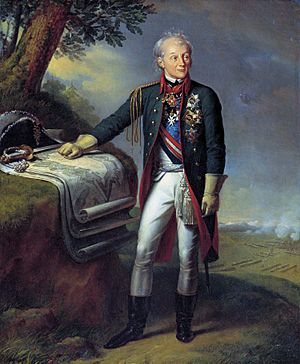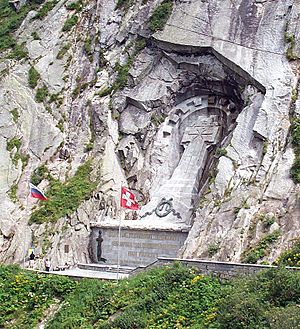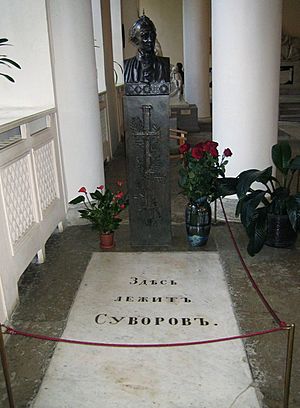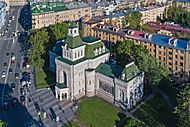Alexander Suvorov facts for kids
Quick facts for kids
Field Marshal Generalissimo
The Count Suvorov
|
|
|---|---|
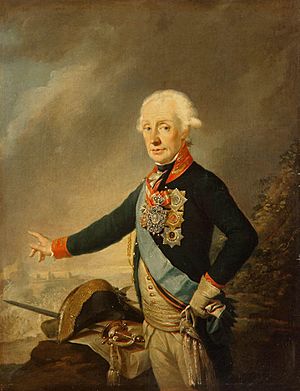
Alexander Suvorov by Joseph Kreutzinger
|
|
| Born | 24 November 1730 Moscow, Moscow Governorate, Russian Empire |
| Died | 18 May 1800 (aged 69) Saint Petersburg, Russian Empire |
| Buried |
Annunciation Church, Alexander Nevsky Lavra, Saint Petersburg
|
| Allegiance | |
| Service/ |
|
| Years of service | 1746–1800 |
| Rank | Field Marshal and Generalissimo of the Russian Empire. |
| Battles/wars | Seven Years' War
Kuban Nogai Uprising Second Russo-Turkish War
Kościuszko Uprising
|
| Awards |
|
Alexander Vasilyevich Suvorov (Russian: Алекса́ндр Васи́льевич Суво́ров, tr. Aleksándr Vasíl'yevich Suvórov; 24 November [O.S. 13 November] 1730 – 18 May [O.S. 6 May] 1800) was a famous Russian general. He served the Russian Empire and is known as one of the greatest military leaders in Russian history. He earned many awards and titles, including being a Count and a Prince. Suvorov was also the last person to hold the title of Generalissimo in the Russian Empire.
He is famous for never losing a single battle he commanded. Suvorov wrote military guides, like The Science of Victory. He also had many well-known sayings about fighting. Today, many military schools, monuments, and museums in Russia are named after him.
Contents
Who Was Alexander Suvorov?
Alexander Suvorov was born in Moscow into a noble family. From a young age, he loved studying military history. He joined the Imperial Russian Army when he was 17. During the Seven Years' War, he showed great skill. He was promoted to colonel in 1762 for his success.
When the War of the Bar Confederation started in 1768, Suvorov captured Kraków. He also defeated Polish forces at Lanckorona and Stołowicze. These victories helped lead to the Partitions of Poland. He then became a general.
Suvorov fought in the Russo-Turkish War (1768–1774). He won a big victory at the Battle of Kozludzha. In 1786, he became a General of the Infantry. He then led troops in the Russo-Turkish War (1787–1792). He won major battles at Rymnik and the Siege of Izmail.
For his achievements, he was made a Count of both the Russian and Holy Roman Empires. In 1794, Suvorov helped put down a Polish uprising. He defeated them at the Battle of Maciejowice and captured Warsaw.
Suvorov and Emperor Paul I
Suvorov was a close friend of Empress Catherine the Great. However, he often argued with her son, Paul. Paul became Emperor after Catherine died in 1796. He did not like Suvorov's military ideas. Paul preferred strict, old-fashioned Prussian army drills and uniforms. Suvorov thought these were useless and even cruel.
Because Suvorov often ignored Paul's orders, Emperor Paul dismissed him. Suvorov was sent away to his country estate. But Paul was later forced to bring Suvorov back. This happened because other countries, who were allies against France, insisted on it. They needed Suvorov's military genius.
Campaigns in Italy and Switzerland
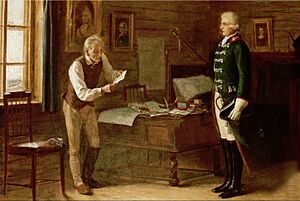
In 1799, Suvorov was given command of the Austro-Russian army. His mission was to drive French forces out of Italy. Suvorov never fought Napoleon directly. Napoleon was campaigning in Egypt at the time. But Suvorov quickly undid most of Napoleon's earlier gains in Italy.
He defeated top French generals like Moreau, MacDonald, and Joubert. Suvorov captured Milan and became a hero to those who opposed the French Revolution. He was even made a Prince of Italy for his victories.
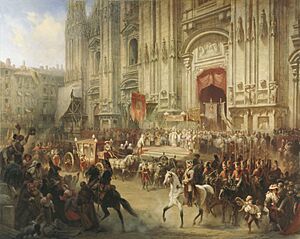
After his success in Italy, Suvorov was ordered to Switzerland. He was supposed to join other Russian forces there. However, the Russian army he was meant to reinforce was defeated. This happened at the Second Battle of Zurich. Suvorov and his 18,000 Russian troops found themselves surrounded by 80,000 French soldiers.
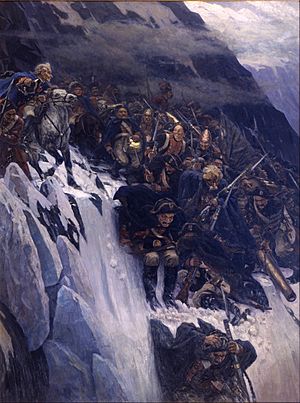
Despite being outnumbered and low on supplies, Suvorov led a brilliant retreat. He guided his army through the snowy Alps, fighting off French attacks. He managed to return to Russia with very few losses. This amazing feat earned him the title of the fourth Generalissimo of Russia.
Suvorov was promised a grand military parade in Russia. But Emperor Paul cancelled it. Paul also recalled the Russian armies from Europe. Suvorov returned to Saint Petersburg in early 1800. He was tired and ill. He died a few days later on May 18, 1800. Emperor Paul interfered with his funeral. Suvorov was buried as a regular field marshal, not a Generalissimo. His simple gravestone says: "Here lies Suvorov."
Suvorov's Military Ideas
Russians remember Suvorov as a great general. He lived simply, like a regular soldier, even during campaigns. He believed that victory depended on the soldiers' morale, training, and ability to act on their own. In battle, he focused on speed, quick movements, accurate shooting, and using bayonets. He also planned battles very carefully.
Suvorov did not like traditional, rigid army drills. He spoke to his troops in clear, simple ways. He also took great care of his army's supplies and living conditions. This greatly reduced illness among his soldiers. Because of this, his soldiers were very loyal and fond of him.
He was wounded six times during his military career. Suvorov's main rule was to find the enemy's weakest point. Then, he would focus his attack there. He would send his units in small groups as they arrived. This helped keep the attack going. He also used aimed fire instead of just shooting many times. He used light infantry as skirmishers and sharpshooters. He changed his army's formations depending on the enemy. He used squares against the Turks, lines against Poles, and columns against the French.
Suvorov saw Hannibal, Alexander the Great, Julius Caesar, and Napoleon Bonaparte as the greatest military commanders. It's interesting that he admired Napoleon, even though he never lived to see the Napoleonic Wars. Military historians often compare Suvorov and Napoleon. They debate who was the better commander.
Suvorov was not interested in politics. He often showed his dislike for court life and the ways of aristocrats. He was very direct in his messages. This sometimes made some courtiers dislike him.
Suvorov's Legacy
Suvorov was buried in Saint Petersburg at the Alexander Nevsky Lavra. A year after his death, Emperor Paul I was killed. His son, Alexander I, then became emperor. Alexander I built a statue to Suvorov's memory in the Field of Mars.
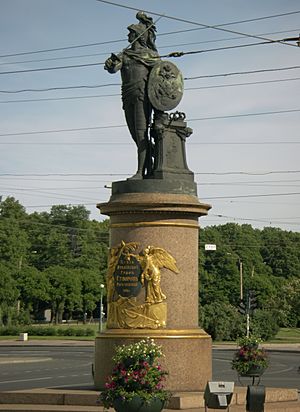
He was famous for his military writings. The most well-known are The Science of Victory and Suzdal Regulations. He also wrote about fighting in mountains. Suvorov had many famous sayings, like:
- "What is difficult in training will become easy in a battle."
- "The bullet is a mad thing; only the bayonet knows what it is about."
- "Perish yourself but rescue your comrade!"
He taught his soldiers to attack quickly and strongly. He would joke with his men, calling them "brother." He made his careful plans seem like sudden brilliant ideas.
Many generals who learned from Suvorov became important leaders in the Russian military. One of them was Mikhail Kutuzov. He led the Russian army against Napoleon during the French invasion of Russia.
The Suvorov Museum opened in Saint Petersburg in 1900. It marked 100 years since his death. There are also many other monuments to Suvorov. You can find them in places like Focșani, Sevastopol, and the Swiss Alps.
During World War II, the Soviet Union remembered heroes like Suvorov. This helped boost patriotism. Joseph Stalin often mentioned Suvorov. Stalin also received the rank of Generalissimo, just like Suvorov. The Order of Suvorov was created in 1942. It is given to army leaders for great leadership in battles.
The town of Suvorovo in Bulgaria is named after him. So was a Russian ship that found Suwarrow Island in 1814.
You can see Suvorov's image on money in Transnistria. There are also squares named after him in Tiraspol and Saint Petersburg.
His military skill and wisdom are still highly respected. Other famous sayings of his include: "Achieve victory not by numbers, but by knowing how" and "Train hard, fight easy. Train easy and you will have hard fighting." The phrase "Train hard, fight easy" became a Russian proverb.
A statue of Suvorov is in the office of the Russian Minister of Defense. In Russia, there are 12 military schools called Suvorov Military School. There is also one in Minsk.
Ukraine
Due to "decommunization policies" in Ukraine, some streets named after Suvorov have been renamed.
- In 2016, a street in Kyiv was renamed after Mykhailo Omelianovych-Pavlenko.
- In September 2022, a street in Dnipro was renamed to honor Alan Shepard.
- In October 2022, during the Russian invasion of Ukraine, Russian troops took a monument to Suvorov from Kherson as they left the city.
- In December 2022, another street in Kyiv was renamed to Serhiy Kotenko Street.
- In January 2023, an image of Suvorov on a monument was removed in Odesa.
See Also
 In Spanish: Aleksandr Suvórov para niños
In Spanish: Aleksandr Suvórov para niños
- Suvorov Military School
- Suvorov military canals
- Suvorov Museum
- Order of Suvorov
- Medal of Suvorov
- Aleksandr Suvorov (ship)
- Russian battleship Knyaz Suvorov
 | May Edward Chinn |
 | Rebecca Cole |
 | Alexa Canady |
 | Dorothy Lavinia Brown |


